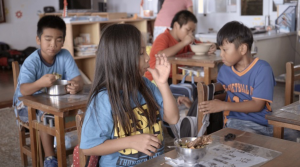The Taste of Apples


Written by Huang Chunming the Taste of Apples is an interesting narration of the lives of a large Taiwanese family and how its members could have different directions following the incident where a foreign essence and power comes in contact with the family head in his. With each member within the family questioning what will become of them.
Coming from Wu Ming-Yi’s novella The Man with the Compound Eyes, the technique to shift narrative perspectives is also shared to be found in Huang Chunming’s novella, as he collects and narrates the plethora of thoughts and perspectives across the Ah family. We find this omniscient trait enhanced by Huang’s technique to break his novella into several sections and title them accordingly to the several significant events of the day as it translates to the lives of the Ah family.
As they took their first bites they said nothing, although they felt that the apples weren’t quite as sweet as they had imagined; rather, they were a little sour and pulpy, and when chewed they were frothy and not quite real. But then they were reminded of their father’s comment that one apple cost as much as four catties of rice, and with that the flavor was enhanced. When they took their second bites, they spiritedly bit off big chunks, with the result that the sickroom was filled with a chorus of loud munching.
I believe that if we deduce from 施老师 title “Tastes replaced” we can understand that Huang Chunming wants us to consider inequalities, and discover what it can mean to a specific family or individual to have their tastes changed. We can understand what is being tasted as an experience between economic classes or racial status. What it tastes like to be Taiwanese in the Mainland, what it tastes like to be American. The Ah family is coming from a place where payment of school fees has been an issue Ah-Ji faces, as wellas ridicule from his teacher. As a child, Ah-Zhu is constantly thinking of herself as a financial burden and she believes that to relieve this pressure is through her adoption into another family. Her role in that new family, however, might just be a subservient one possibly as a maid to the new household. While Ah-Fa wakes up early mornings to farm and tries to provide for seven mouths.
When I think of the contents and realities of the Ah family without the introduction of Colonel Grant, it appears to me that their story is one not much of us in this class will be able to understand or relate will so deeply. There is a clash in the realities not only between Colonel Grant and Ah-Zhu’s family but us as affluent members in our communities and the case of the Ah family who tastes an apple for the first time. We too as readers are getting our tastes changed as Huang Chunming details out the strugglings of the Ah family, basic things that we easily overlook we are living and tasting as we leaf through his novella.
Also, here a family tastes bitter because instead of the quintessential or archetypal family we imagine or have, we find family here almost as a burden, especially in regards to financial stress. Maybe the acquitment of money is a necessary ingredient to the idolised and fairytale family? Reading I found the reaction to the tragic event of their father as skewed, to the extent that Ah-Ji one of thesons after hearing Ah-Gui talk of his new responsibility in light of their father’s accident he “began to giggle”. The other reaction is Ah-Gui putting on a performance of sobbing and tears to prompt recognition by the foreigner, nurse, and policeman of the severity of her family’s dilemma.
However, we must understand that this act by Ah-Gui was necessary to have her family’s life relevant to taste to the police or American. Because after all, “one apple cost as much as four catties of rice”. A damning metaphor that the life of Ah-Fa as a Taiwanese is one-fourth to the life of an American or Westerner.
Hi MAATAW
Providing supplies and nutritious meals to those living on Maataw is a complicated matter. Because of the severe weather patterns, often, the amount of supplies being delivered needs to be adjusted. For instance, if there is potential for a hurricane, the island needs to plan ahead. Lanyu High School regularly receives shipments of resources they need for everyday life. Sometimes the supplies are destroyed in the shipping process. Unfortunately, the school relies on much of the produce for daily meals. Another complication is that the produce comes from all across the country so there are many different providers involved. Another potential issue is that much of the food being served isn’t sustainable on the island. Historically, those on Maataw island ate foods that are plentiful in the area. Some crops such as rice and wheat, however, don’t grow well on the island. As more meals are imported from elsewhere, the diet of the islander changes, which could be a problem for some.

One question that asked in the class discussion was “how should Lanyu High School address the cultural aspects of eating that indigenous people on the island had?” Eating customs are an integral part of many cultures. It’s important to recognize the cultural significance of certain foods although it may be difficult to provide specific meals. Especially in the case of Maataw, there isn’t a way to provide such cultural foods in a large enough quantity for all those at the school. In this case, the school can educate the population on the past cultural eating customs, while recognizing that it isn’t realistic to provide these customs for all.

Recent Comments